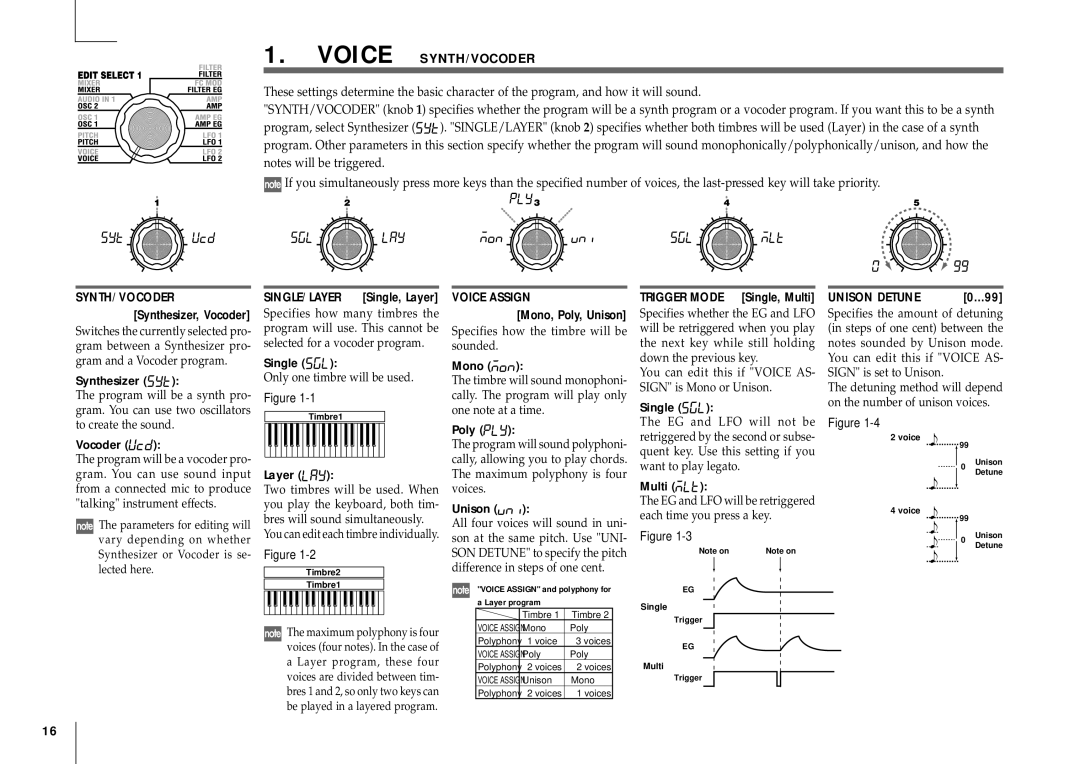
1.VOICE — SYNTH/VOCODER
These settings determine the basic character of the program, and how it will sound.
"SYNTH/VOCODER" (knob 1) specifies whether the program will be a synth program or a vocoder program. If you want this to be a synth
program, select Synthesizer (![]()
![]() ). "SINGLE/LAYER" (knob 2) specifies whether both timbres will be used (Layer) in the case of a synth program. Other parameters in this section specify whether the program will sound monophonically/polyphonically/unison, and how the notes will be triggered.
). "SINGLE/LAYER" (knob 2) specifies whether both timbres will be used (Layer) in the case of a synth program. Other parameters in this section specify whether the program will sound monophonically/polyphonically/unison, and how the notes will be triggered.
![]() If you simultaneously press more keys than the specified number of voices, the
If you simultaneously press more keys than the specified number of voices, the
SYNTH/VOCODER [Synthesizer, Vocoder]
Switches the currently selected pro- gram between a Synthesizer pro- gram and a Vocoder program.
Synthesizer (![]()
![]()
![]() ):
):
The program will be a synth pro- gram. You can use two oscillators to create the sound.
Vocoder (![]()
![]()
![]() ):
):
SINGLE/LAYER | [Single, Layer] |
Specifies how many timbres the program will use. This cannot be selected for a vocoder program.
Single (![]()
![]()
![]() ):
):
Only one timbre will be used.
Figure
Timbre1
VOICE ASSIGN
[Mono, Poly, Unison]
Specifies how the timbre will be sounded.
Mono (![]()
![]()
![]() ):
):
The timbre will sound monophoni- cally. The program will play only one note at a time.
Poly (![]()
![]()
![]() ):
):
The program will sound polyphoni-
TRIGGER MODE [Single, Multi]
Specifies whether the EG and LFO will be retriggered when you play the next key while still holding down the previous key.
You can edit this if "VOICE AS- SIGN" is Mono or Unison.
Single (![]()
![]()
![]() ):
):
The EG and LFO will not be retriggered by the second or subse- quent key. Use this setting if you
UNISON DETUNE | [0...99] |
Specifies the amount of detuning (in steps of one cent) between the notes sounded by Unison mode. You can edit this if "VOICE AS- SIGN" is set to Unison.
The detuning method will depend on the number of unison voices.
Figure
2 voice
![]() 99
99
The program will be a vocoder pro- gram. You can use sound input from a connected mic to produce "talking" instrument effects.
Layer (![]()
![]()
![]()
![]()
![]() ):
):
Two timbres will be used. When you play the keyboard, both tim-
cally, allowing you to play chords. The maximum polyphony is four voices.
Unison (![]()
![]()
![]() ):
):
want to play legato.
Multi (

 ):
):
The EG and LFO will be retriggered each time you press a key.
0
4 voice
Unison Detune
The parameters for editing will
bres will sound simultaneously.
All four voices will sound in uni-
![]() 99
99
vary depending on whether Synthesizer or Vocoder is se- lected here.
You can edit each timbre individually.
Figure
Timbre2
Timbre1
![]() The maximum polyphony is four voices (four notes). In the case of a Layer program, these four voices are divided between tim- bres 1 and 2, so only two keys can be played in a layered program.
The maximum polyphony is four voices (four notes). In the case of a Layer program, these four voices are divided between tim- bres 1 and 2, so only two keys can be played in a layered program.
son at the same pitch. Use "UNI- SON DETUNE" to specify the pitch difference in steps of one cent.
"VOICE ASSIGN" and polyphony for a Layer program
| Timbre 1 | Timbre 2 |
VOICE ASSIGN | Mono | Poly |
Polyphony | 1 voice | 3 voices |
VOICE ASSIGN | Poly | Poly |
Polyphony | 2 voices | 2 voices |
VOICE ASSIGN | Unison | Mono |
Polyphony | 2 voices | 1 voices |
Figure
Note on | Note on |
EG
Single
Trigger
EG
Multi
Trigger
0
Unison Detune
16
